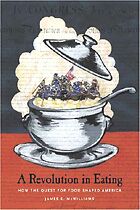|
Reading about food
Let's take a break from the kitchen today and spend our time in the library instead. Every year as we start to get close to the holiday season, I enjoy browsing through my stacks of recently arrived food, wine and cookbooks and pick out a few particularly good ones for review. Here are two that I found particularly interesting: A breakfast-and-brunch cookbook from the Culinary Institute of America; and a rather scholarly (but not dry or boring) overview of food and cookery history in early America.
 Culinary Institute of America: Breakfasts & Brunches is a coffee-table-size book full of the lavish color photography that's typical of the genre. To its credit, though, it's not just a look-at-food volume but a serious cookbook that's chock full of ideas, recipes and cooking tips for indulgent breakfasts and brunches.
Culinary Institute of America: Breakfasts & Brunches is a coffee-table-size book full of the lavish color photography that's typical of the genre. To its credit, though, it's not just a look-at-food volume but a serious cookbook that's chock full of ideas, recipes and cooking tips for indulgent breakfasts and brunches.
Calling breakfast "the most intensely personal of meals," the editors observe, "Breakfast is a hard habit to change, but if you are in the habit of stumbling through the door with just a mug of coffee or tea, you owe it to yourself to try to get into the breakfast habit. We all have favorites, the morning equivalent of the comforting soups and stews we use to get through the winter."
The authors do a fine job of mustering more than 175 recipes that range from the simple basics (fried, poached and scrambled eggs) through more advanced efforts (brioche, puff pastry, eggs benedict and frittata) to some serious brunch dishes that, if nobody's looking, would serve just as well as an evening course (couscous salad with curry vinaigrette, roast turkey breast with pan gravy and chestnut dressing). Separate chapters break out the morning bill of fare into a sensible set of categories: Muffins, quick breads and coffee cakes; sweet and savory breads and pastries; pancakes, waffles and crepes; eggs; grains and legumes; meats, fish and potatoes; soups salads and small bites; and an eclectic selection of breakfast and brunch drinks, including both non-alcoholic libations and stronger stuff. Despite the Culinary Institute of America's reputation as a serious, advanced cooking school, the recipes range from easy to moderate in skill, and appear carefully edited to avoid requiring professional techniques or unusual equipment. You won't need to rush out and buy a chinois or a mushroom brush before you can proceed with your brunch. Recipes are well organized and clearly expressed, with lots of helpful cooking tips; it's the next-best thing to having a CIA instructor-chef standing at your side and offering suggestions as you cook. My only serious complaint has to do with design, not content: May whoever decided to have the cooking tips printed in an unreadably tiny pale-green type font be afflicted with early-onset presbyopia as a punishment for his sins.
To purchase Breakfasts & Brunches from Amazon.com for $23.10, a 34 percent saving from the $35 list price, click
 You probably need to be a fairly dedicated "foodie" to enjoy reading a relatively scholarly work of food history as if it were a beach novel. But I was smitten within the first few paragraphs of James McWilliams's A Revolution In Eating: How the Quest for Food Shaped America, for McWilliams writes scholarly non-fiction with much of the easy-reading style of, well, a beach novel. Like this ...
You probably need to be a fairly dedicated "foodie" to enjoy reading a relatively scholarly work of food history as if it were a beach novel. But I was smitten within the first few paragraphs of James McWilliams's A Revolution In Eating: How the Quest for Food Shaped America, for McWilliams writes scholarly non-fiction with much of the easy-reading style of, well, a beach novel. Like this ...
"On a warm spring afternoon in 1650, Rebecca Cole stepped out of her garden, entered her kitchen, and began to cook. Maryland, where the Cole family had migrated from Middlesex, England, was becoming well known not only for its profitable tobacco crops but also for its ample corn, abundant garden vegetables, and healthy supply of meat. And that combination, as it did on most days, would make up the evening meal. Rebecca had started soaking corn kernels at the crack of dawn to soften them for pounding, an exhuasting task made necessary by the lack of a local gristmill. She knew that she needed about six cups of cornmeal to feed her husband, five children and herself. So for the next couple of hours, Rebecca and her two daughters dutifully hunched over a large mortar, took wooden pestles in hand, and reduced a tub of white corn kernels into a gritty heap of meal. Over 321 pages tightly packed with fact and anecdote, McWilliams takes us on a tour of Colonial America, showing us the often surprising connections, echoing the Brillat-Savarin quote featured at the start of Iron Chef, between what we eat and who we are. Did the butler do it? No. But perhaps the farmer did.
To purchase A Revolution In Eating from Amazon.com for $19.77, a 34 percent saving from the $29.95 list price, click
DISCUSS COOKING IN OUR ONLINE FORUM: Click the REPLY button on the forum page to post a comment or response. (If your E-mail software broke this long link in half, take care to paste it all back into one line before you enter it in your Web browser.) If you prefer to comment privately, feel free to send me E-mail at wine@wineloverspage.com.
PRINT OUT A COPY OF THIS ARTICLE: Last Week's FoodLetter and Archives
• Last week's Wine Advisor Foodletter: The pork chop dilemma (Nov. 10, 2005)
• Wine Advisor Foodletter archive:
• 30 Second Wine Advisor archive: Let us hear from you! If you have suggestions or comments about The 30 Second Wine Advisor's FoodLetter, or if you would like to suggest a topic for a coming edition and recipe, please drop me a note at wine@wineloverspage.com. I really enjoy hearing from you, and I try to give a personal reply to all mail if I possibly can.
Of course you also have a standing invitation to participate in our interactive Food Lovers' Discussion Group. To participate in this friendly online community, simply click to
SUBSCRIBE:
Administrivia This is The 30 Second Wine Advisor's weekly FoodLetter. To subscribe or unsubscribe, change your E-mail address, or for any other administrative matters, please use the individualized hotlink found at the end of your E-mail edition. If this is not practical, contact me by E-mail at wine@wineloverspage.com, including the exact E-mail address that you used when you subscribed, so I can find your record.
Thursday, Nov. 17, 2005
FoodLetter archives Subscribe to the 30 Second Wine Advisor
|




